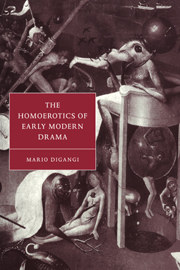Book contents
- Frontmatter
- Contents
- Preface
- 1 Introduction
- 2 The homoerotics of marriage in Ovidian comedy
- 3 The homoerotics of mastery in satiric comedy
- 4 The homoerotics of favoritism in tragedy
- 5 The homoerotics of masculinity in tragicomedy
- Notes
- Bibliography
- Index
- Cambridge Studies in Renaissance Literature and Culture
4 - The homoerotics of favoritism in tragedy
Published online by Cambridge University Press: 02 December 2009
- Frontmatter
- Contents
- Preface
- 1 Introduction
- 2 The homoerotics of marriage in Ovidian comedy
- 3 The homoerotics of mastery in satiric comedy
- 4 The homoerotics of favoritism in tragedy
- 5 The homoerotics of masculinity in tragicomedy
- Notes
- Bibliography
- Index
- Cambridge Studies in Renaissance Literature and Culture
Summary
The sodomitical subject of tragedy
For understanding the politics of male homoerotic relations in early modern England, Chapman's The Gentleman Usher (1602) offers a simple but crucial lesson: some homoerotic intimacies are more threatening to social order than others. With his administrative responsibilities and authority over other servants, a gentleman usher or steward, if corrupt or incompetent, could impede the smooth functioning of a noble household. Bassiolo may represent just such an ambitious and disorderly household servant, but it is Mendice, the court favorite, who is finally banished from the play. Although both Bassiolo and Mendice have disruptive access to the bodies of their social superiors, Mendice's access is more dangerous because his master is the Duke.
In early modern Europe, favorites could acquire tremendous power through their closeness to the body of the prince. The correlation between political power and physical proximity to the monarch's body was complexly negotiated in the court of Queen Elizabeth. Elizabeth's domestic intimates were women and therefore not holders of political office, although they did wield considerable influence with the queen in matters of patronage. Throughout her reign, Elizabeth had various male favorites such as Leicester, Ralegh, and Essex, who provides the most notorious example of one who pressed to the limit of treason his privileged closeness to the queen. As for courtiers and statesmen, new historicist and feminist scholars have explored how Petrarchan conventions shaped political relations generally in the Elizabethan court.
- Type
- Chapter
- Information
- The Homoerotics of Early Modern Drama , pp. 100 - 133Publisher: Cambridge University PressPrint publication year: 1997



